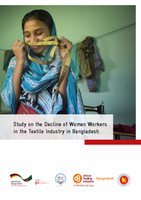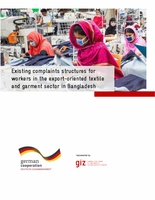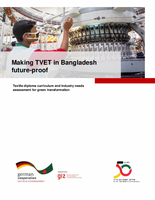Contributions Overview

Study: Why are women a declining share of the RMG workforce in Bangladesh?
The growth of the ready-made garment industry (RMG) in Bangladesh has transformed the country by generating unprecedented job opportunities for women. However, whilst still making up a slight majority of the RMG workforce (around 53%), recent data suggests that employment in the sector is becoming less female-dominated. Based on factory surveys and focus group discussions in Bangladesh, this new GIZ study digs deeper into this trend, understand why women comprise a declining share of the RMG workforce, and to explore the implications for both the industry and the wider labour market.

The German Government is committed to human rights and environmental due diligence and passed an act on Corporate Due Diligence Obligations in Supply Chains in 2021. The project Initiative for Global Solidarity (IGS) has 4 areas of action for the project, where action field (4) is about establishing and further developing effective internal and external complaints mechanisms. The report is meant to review the existing complaints structures for workers in Bangladesh's export-oriented textile and garment sector. This includes an analysis of (legal) national requirements, stakeholder mapping, and detailed analysis of internal and external complaint mechanisms.

Making TVET in Bangladesh future-proof
Textile diploma curriculum and industry needs assessment for green transformation. Published by the project Higher Education and Leadership Development for Sustainable Textiles in Bangladesh (HELD) which is implemented by the Deutsche Gesellschaft für Internationale Zusammenarbeit (GIZ) GmbH on behalf of the German Federal Ministry for Economic Cooperation and Development (BMZ) in cooperation with the Secondary and Higher Education Division (SHED) of the Ministry of Education (MoE) as the line ministry and the University Grants Commission of Bangladesh as the executing agency.
